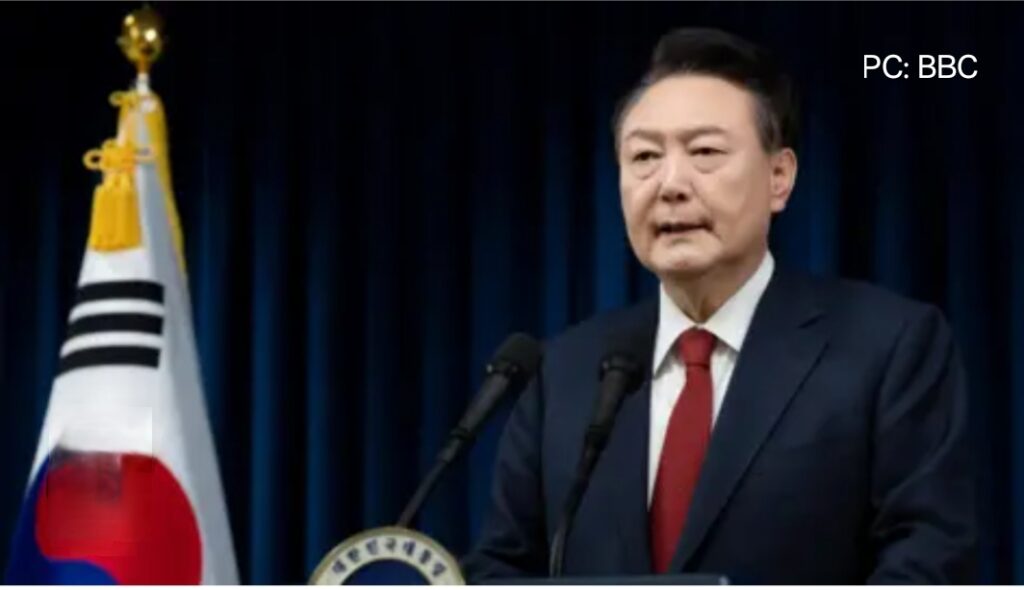The Spotlight: Martial Law Declared
The terra firma of the dynamic K-Pop came to a standstill on December 3, 2024, when the South Korean President, Yoon Suk Yeol declared martial law, citing ‘anti-state activities’. Military troops cordoned off the National Assembly, barring lawmakers and keeping the nation in suspense. The crisis was short-lived and by the dawn of December 4, 190 lawmakers convened to unanimously reject the decree. Such actions may have prevented a long and protracted crisis, but it had ripple effects on many sectors of the society, especially that of entertainment.
Curtains Fall: Immediate Impact On The Entertainment Industry
Though the imposition was lifted within 6 hours, its impact resonated deeply in its vivid entertainment industry. Major K-pop concerts, high-profile fan meetings and live drama shoots were abruptly cancelled or postponed. Production teams scrambled to rethink their plans, leaving a mess of schedules and concerned about loss in revenue. While agencies like HYBE or SM Entertainment, the custodians of global pop phenomena like BTS and Blackpink, faced a nightmare, the smaller agencies were suddenly left to deal with losses. The entire industry became fragile under the weight of political turmoil.
Hallyu On Pause: A Global Phenomenon Interrupted
The “Hallyu wave,” which made South Korea an exporting powerhouse for cultural products, turned cold, temporarily losing its momentum. Martial law brought public assemblages to a standstill, leaving international followers to scuttle around in a void over cancelled world tours, delayed albums, and interrupted streaming schedules. The episode on martial law, however temporary it might have been, shattered the confidence of both international partners and fans.
A Flashback Of The Past
The imposition of martial law was not a first for South Korea. In 1980, during the Gwangju Uprising, Chun Doo-hwan’s regime used martial law to supress pro-democracy protests, leading to hundreds of civilians deaths. This counted as one of the most frustrating wounds in the national collective memory. The episode became a driving force of democratic reform, ultimately leading to the state’s democratization in 1987. The 2024 event differed in scale but it served as a reminder to the citizens about the importance of safeguarding their democratic freedoms.
A New Rhythm of Protest: Creativity Meets Activism
Unlike the fiery protests of the past, the recent protests that demanded the impeachment of President Yoon Suk Yeol, the demonstrators had adopted an innovative symbol of K-Pop light sticks. Traditionally waved by fans during concerts, these colourful sticks were converted into mechanisms of political expression, as people chant “Impeach, Impeach, Impeach Yoon Suk Yeol” in sync with aespa’s latest techno hit, “Whiplash.” This shift in methods of protest shows how South Korea has influenced dissent expression in the culture through its entertainment industry. It also notes the increasing convergence of culture with activism so that protests became freedoms, celebrations of creativity.
Entertainment: The Heart & Identity of South Korea
The South Korean entertainment industry is more than just an economic engine; it embodies the nation’s values and aspirations. Dramas and films surrounding gender equality and mental health and political corruption have made it into a worldwide cultural beacon. Prolonged martial law could have censored this creative liberty and suffocated the most progressive pieces that hold society accountable toward truth and relevance.
Unscripted Solidarity: Industry & Public Align
Despite the chaos, the industry synchronized itself with public beliefs against martial law. Agencies ceased their activities, and artists did not make public appearances. The declaration by the President triggered widespread protests in the country with citizens and eminent personalities condemning the decree. As the silent show of solidarity with its public, the entertainment industry served to allude its cultural voice for freedom and justice.
The entertainment industry made a powerful demand for the resignation of the President. In a historical show of events, 77 film organizations and 2,518 professionals, from directors to producers and writers, signed a petition condemning the administration of President Yoon for not receiving the guarantees for democracy. Key Hallyu stars were among the hundreds of signatories in the direct opposition of the President’s policy.
A Beacon of Change: How Entertainment Shapes Minds
The episode also unveiled the great motivating force of the country’s entertainment industry in terms of transforming the societal values. It made the citizens much knowledgeable about relevant social problems; the cultural influences have thereby built a well-informed society which became resistant to the attempts at losing democratic liberties. Innovative and dramatic protests would mark a new way for South Koreans to adopt activism, infused with the spirit of the entertainment sector. It would reflect in the very spirit of activism from being only a mirror of society to being one of the most important means by which societies can shape their futures.
The Show Must Go On: Lessons Of Resilience
Those six hours were a wake-up call for the entertainment industry to re-examine its crisis preparedness. Agencies have since adopted contingency plans to enhance operations for future crisis scenarios. This short episode reaffirmed the power of the entertainment industry as a cultural ambassador for democracy and resilience, capable to create narratives for freedom and reflection of societal values.
The Final Act: The Nation & Industry Reclaim The Spotlight
Indeed, it has been a momentary thing that highlighted the politics-culture nexus. As the country progresses on its democratic journey, its entertainment industry is a living testament to the power of creative freedom and collective strength. The lights are back up, the music is going, and cultural behemoth South Korea is once again ready to captivate the world by its entertainment industry.
Authors: Seema Meena, Manasvi Shah & Misha Bhanushali

